The history of the relationship between Saint John Paul II and the Neocatechumenal Way, with Kiko, Carmen and Father Mario, has been incredible. Something great: on the one hand he has understood with prophetic spirit the gift that the Way was for the Church and on the other hand, on the part of the initiators of the Way there has been a correspondence made of trust and involvement in the mission of the Church.
With all reason Kiko has stated: «In John Paul II I have found a giant: he has always given us twice what we had asked or expected of him, he has always gone further: something that made you feel small. He approved the Camino with a surprising Letter to Bishop Josef Cordes, charged by him to follow the apostolate of the Camino, which said: “… I want the brothers in the Episcopate to value and help – together with their priests – this work for the new evangelization, to be carried out along the lines proposed by the initiators… ”; It was more than we could imagine. He has had the courage to approve the Foundation of the Redemptoris Mater Seminary in Rome, against a thousand difficulties and controversies ».

Kiko remembers the first meeting with Pope John Paul II, at the end of the Eucharist in the chapel of Castel Gandolfo: «… at the end of the Mass he told us that during the celebration, and thinking of us, he had seen before him: “Atheism, Baptism, Catechumenate”. And that surprised us because he had put the word Catechumenate after Baptism, something unusual and totally new, especially after the tribulations that we were having just because we spoke of a Catechumenate after baptism ».
After the Mass I asked him if he could receive me alone and he took me by the arm and led me to a room where we sat opposite each other. I, full of fear, I have told him about the apparition received from the Holy Virgin Mary: “It is necessary to make communities like the Holy Family of Nazareth that live in humility, simplicity and praise; the other is Christ ”. I was telling him this, even if I was afraid he would consider me a “visionary”, and asked him: “These communities, Father, what are they?” We had, in fact, the problem of our identity in the parishes: a movement? a lay association? what are we? What are we in the Church? And he, to my surprise, said to me: “They are the Church” ».
The Pope was always fond of Carmen, he had a great admiration for her, recognizing the importance that she had for the Way, especially for her “feminine genius” and for her great love for the Council and the Church. Kiko always remembers an anecdote: “When, as a consultant to the Pontifical Council for the Laity, after a plenary session, we passed one by one in front of the Holy Father, to greet him (he was already very ill): we did not know if he was hearing or not, He was sitting with his head bowed and his eyes closed. When I arrived in front of him, Cardinal Rylko, who was next to him, said in his ear: “It is Kiko.” Immediately, the Pope has raised his head, opened his eyes and with a strong voice said: “And Carmen! Where is Carmen?”. And everyone present gave a great applause ».
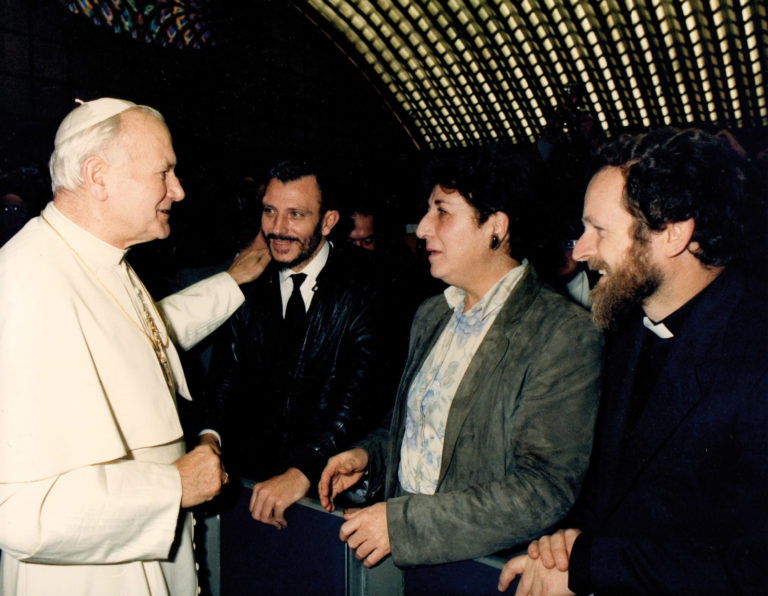
«Fundamentally we can say -Kiko continues- that Saint John Paul II was a man without any kind of clericalism, without suspicion, always affable. IA can say that he was a friend, and better yet: “a prophet”. At the VI Symposium of the European Bishops, on October 11, 1985, he made a very in-depth analysis of the situation of secularization in Europe, of social relativism, of the destruction of the family, of lack of vocations, etc. Faced with this analysis, which at first glance seemed catastrophic, he began by telling the Bishops that the Holy Spirit had already responded to this situation. In order to find “symptoms of this breath of the Spirit”, he said, “it is necessary to leave stunted schemes” and go where the Holy Spirit is seen at work, where families are rebuilt again, where vocations return, where there is a real growth of faith… And he concluded by affirming that the Church must return to the Cenacle, to receive the Holy Spirit that may help in the New Evangelization and that for this reason it is necessary “to be inspired again by the very first apostolic model”. Does this perhaps mean that the Church must meet again in the houses, as, for example, the Letter to the Colossians says, where Saint Paul says to greet Nymphs and the Church that meets in his house…? ».
As an archbishop of Krakow, he had already known and welcomed the Neocatechumenal Way, but it was above all during his long pontificate that he came deeply into contact with this “gift of God for his Church” [1].
Pope John Paul II began to visit the parishes of the diocese of Rome and to find there the reality of the Way. Doing this he gets to know directly what the Way is, the good he is doing in the parishes, how it is bringing back so many far away to the Church, to the joy of Baptism, to the beauty of life: he sees the communities full of couples that open themselves to life without fear, full of young people and from his father’s heart come out words of encouragement, of joy. He himself asks that some particular song of the Way to be sung, a song that he has learned to know through of his numerous trips on the five continents.
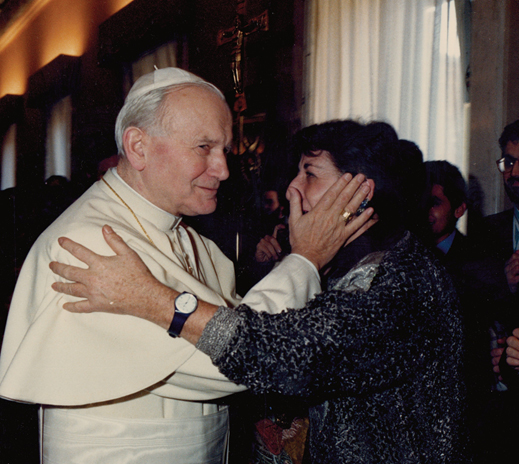
Visiting the communities, at the end of the pastoral visit to the parish of Our Lady of the Blessed Sacrament and Holy Canadian Martyrs of Rome, he spoke of the “radical confrontation” present in society today and that for this reason “we need a radical faith” :
My dearest ones, we are living in a period in which we are experiencing a radical confrontation – and I say this, because it is my experience over many years – a radical confrontation that is everywhere. There is no one single manifestation of this, but many throughout the world: faith and antifaith, Gospel and anti-Gospel; Church and anti-Church, God and anti-God, if we can put it like that. An anti-God does not exist, an anti-God cannot exist, but an anti-God can exist in man, the radical denial of God can be created in man. We are living this experience in our history, and more so than in previous times. In this age of ours, we need to rediscover a radical faith, radically understood, radically lived, and radically fulfilled. We have need of such a faith. I hope that your experience is born within such a perspective, and may Lead towards a healthy radicalization of our Christianity, of our faith, towards an authentic evangelical radicalism…[2]
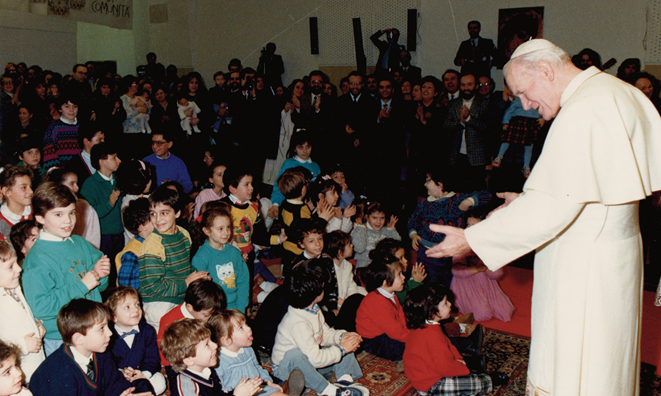
A few years later, in the Parish of Santa Maria Goretti he will say:
This is how I see the origins of the Neo-catechumenate, of its way. Someone – I don’t know if it was Kiko or someone else – asked himself: “Where did the strength of the early Church come from, and where does the weakness of today’s Church-a Church with much greater numbers – come from?” I believe he found the answer in this Way.
I hope you will continue in this Way, to continue to accept all the demands which it makes, because it is not a short Way. If you consider the missionary catechumenate, it sometimes looks hard – four years! You are more demanding; yours lasts seven years or more! So then I hope that you will continue always to be demanding in your Way, and I hope above all that you continue to produce all these fruits, because among your communities it is evident how all the fruits of the Holy Spirit grow from baptism, all the charisms of the Holy Spirit, all vocations, the whole authenticity of the Christian life in marriage, in the priesthood and all the various professions, finally in the world. [3]
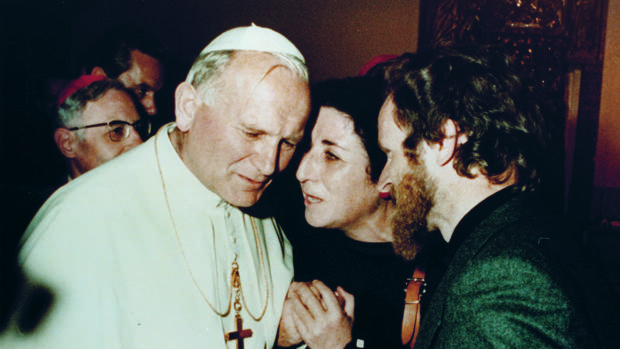
Here is the Neocatechumenate as a secular reality, that means a community that finds again in the parish the novelty of the Christian life, its freshness, its originality, because this is life in its full sense, the divine life. This is the life that projects us towards eternity, not just to live the life of the years here on earth. Life with God, life as children of God, animated by the Only Begotten Son of God who is the Word, the Word incarnate and born of the Virgin Mary: Jesus Christ [4].
And in the Christian initiation there is the community dimension that the Holy Father often stresses:
And you explain all this with your community, with your fraternal communion and with your joy, also with your singing, and certainly with prayer … [5].
The group or rather the Community is always formed from within, inside, and it is within that the Holy Spirit touches each one us, what each one of us is, his personal intimacy, his spiritual intimacy, but it does not touch any of us separately, individually, because He created us to be a Community, to live in communion. He touches each of us to rebuild us in communion and this is how all these communities within the Christian communion can be explained, communities like yours, like all yours because are five communities [6].
Furthermore, you do this, you [discover what baptism is], in the communities. It is not a process that takes place in solitude, it is a process of the community, a process that takes place together. You live the joy of rediscovering Baptism, its true meaning, its true reality together [7].
In the parish of San Félix of Cantalice (Rome) the Pope underlines the gift of children in the communities of the Way
They say that Neocatechumens are said to have large families, they have so many children !: this is a test of faith, of faith in God. To give life to man it takes faith in God. If today we live through this great so-called demographic crisis, family crisis, parenthood crisis, motherhood crisis it is just a consequence of a lack of faith in God. It can’t be improved this problem if not with deep faith in God. A great faith in God to give life to man [8].
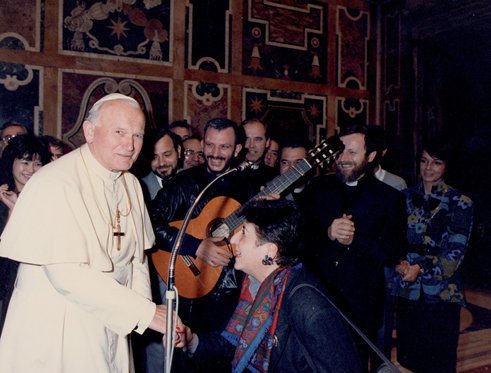
And in the Parish of St. Mary Goretti he adds:
Indeed, how else to explain the anti-birth mentality of communities, of nations, of groups, and of political circles? The explanation is in the lack of faith in man. But this lack of faith in man derives from a lack of faith in God. Man has his dimension, his origin and this origin of his is God himself because man has been created in God’s image and likeness. This explains who man is, how he can live and how he can die. You need courage to live in this world and in this meeting with these families and these itinerants I see a sign of Christian courage [9].
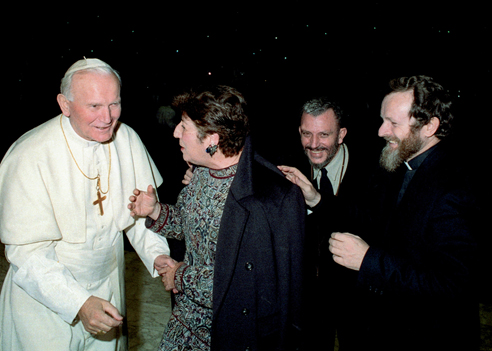
As the conclusion of this brief presentation of the relatiionship between Saint John Paul II and the Neocatechumenal Way, and as a seal of an ecclesial path full of fruits and heavenly blessings, it seems necessary to remember his consoling words at the end of the journey of preparation and approval of the Statute, in Castel Gandolfo in 2002:
How not to thank the Lord for the fruits produced by the Neocatechumenal Way in its more than thirty years of existence! In a secularized society like ours, where religious indifference reigns and many people live as if God does not exist, there are many who need to rediscover the sacraments of Christian initiation, especially Baptism. The Way is, without a doubt, one of the providential answers to this urgent need.
We contemplate your communities: How many rediscoverings of the beauty and greatness of the baptismal vocation! How much generosity and zeal in the proclamation of the Gospel of Jesus Christ, in particular the most outcast! How many vocations to the priesthood and religious life emerged thanks to this itinerary of Christian formation! [10].
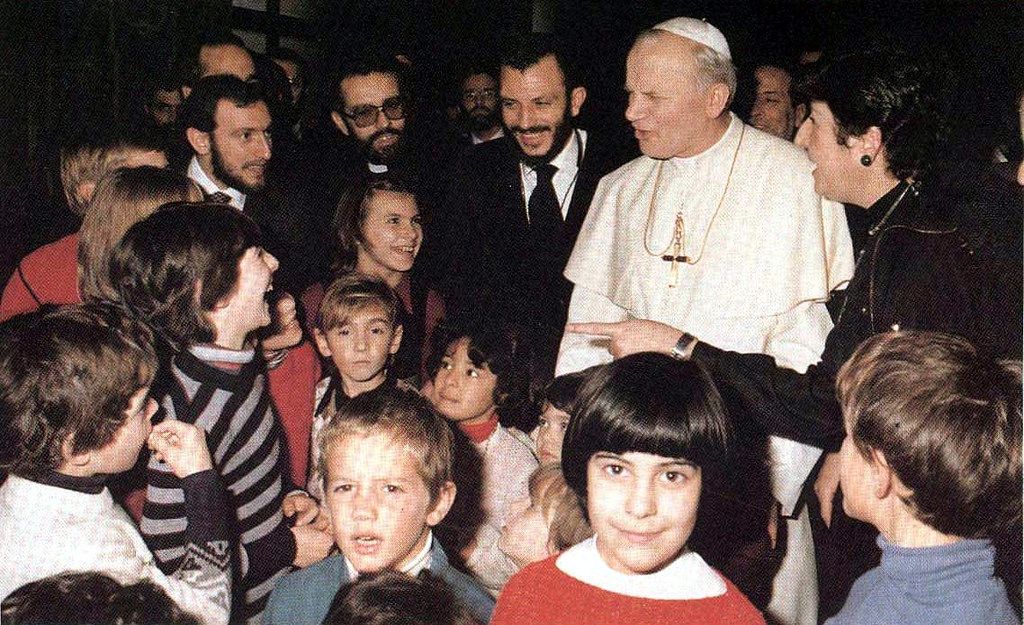
[1] Benedict XVI, Address to the members of the Neocatechumenal Way, January 17, 2011.
[2] L’Osservatore Romano, 3-4 November 1980.
[3] L’Osservatore Romano, 1-2 February 1988.
[4] Visit of Pope John Paul II to the parish of Santa Ana in Casal Morena (Rome), at L’Osservatore Romano, 3-4 December 1984.
[5] Visit of Pope John Paul II to the parish of Saint Anthony in Piazza Asti (Rome), in L’Osservatore Romano, 7-8 May 1979.
[6] Visit of Pope John Paul II to the parish of St. Luke the Evangelist (Rome), at L’Osservatore Romano, 5-6 November 1979.
[7] Visit of Pope John Paul II to the parish of St. John the Evangelist in Spinaceto (Rome), at L’Osservatore Romano, November 19-20, 1979.
[8] Cf. L’Osservatore Romano, 5-6 May 1986, integrating what was recorded during his speech.
[9] L’Osservatore Romano, February 1-2, 1988.
[10] Address of the Holy Father to the initiators of the Way, to itinerant Catechists and to the priests of the Neocatechumenal Way, (Castel Gandolfo, September 21, 2002), in L’Osservatore Romano, September 22, 2002.